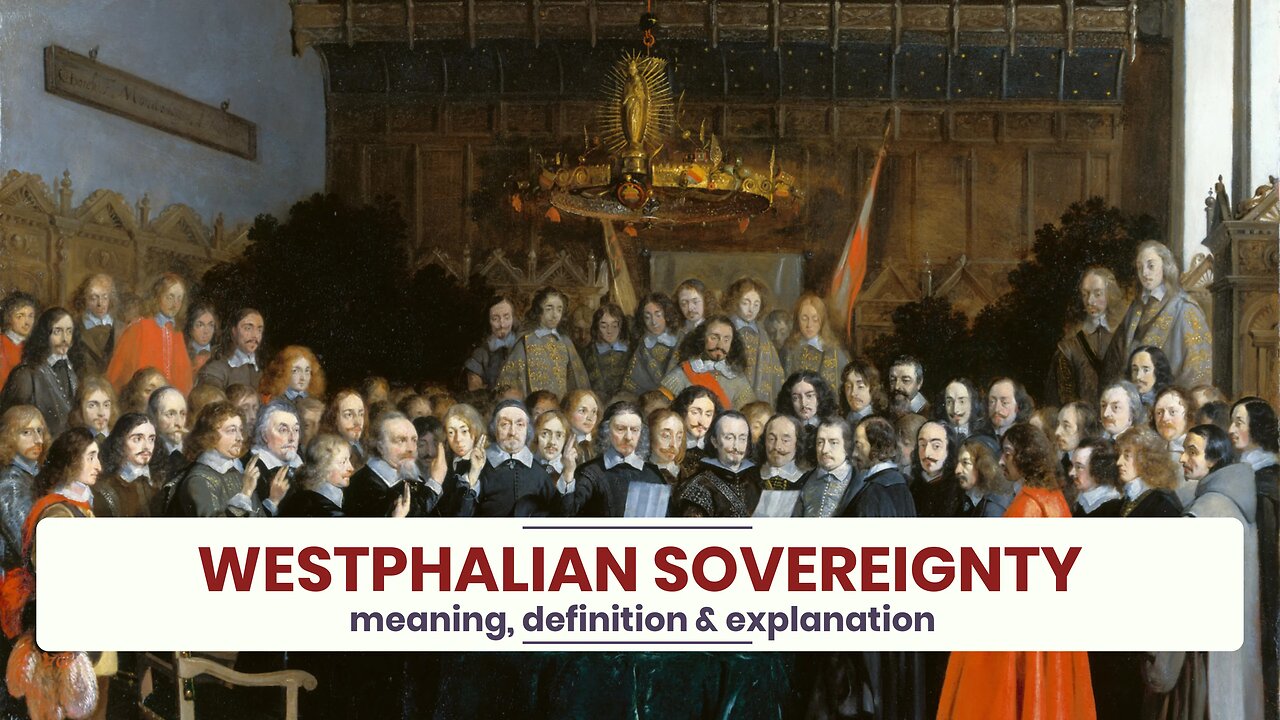Premium Only Content

What is WESTPHALIAN SOVEREIGNTY?
✪✪✪✪✪
http://www.theaudiopedia.com
✪✪✪✪✪
What does WESTPHALIAN SOVEREIGNTY mean? WESTPHALIAN SOVEREIGNTY meaning - WESTPHALIAN SOVEREIGNTY definition - WESTPHALIAN SOVEREIGNTY explanation. What is the meaning of WESTPHALIAN SOVEREIGNTY? What is the definition of WESTPHALIAN SOVEREIGNTY? What does WESTPHALIAN SOVEREIGNTY stand for? What is WESTPHALIAN SOVEREIGNTY meaning? What is WESTPHALIAN SOVEREIGNTY definition?
Westphalian sovereignty is the principle of international law that each nation state has sovereignty over its territory and domestic affairs, to the exclusion of all external powers, on the principle of non-interference in another country's domestic affairs, and that each state (no matter how large or small) is equal in international law. The doctrine is named after the Peace of Westphalia, signed in 1648, which ended the Thirty Years' War, in which the major continental European states – the Holy Roman Empire, Spain, France, Sweden and the Dutch Republic – agreed to respect one another's territorial integrity. As European influence spread across the globe, the Westphalian principles, especially the concept of sovereign states, became central to international law and to the prevailing world order.
Scholars of international relations have identified the modern, Western-originated, international system of states, multinational corporations, and organizations, as having begun at the Peace of Westphalia. Both the basis and the conclusion of this view have been attacked by some revisionist academics and politicians, with revisionists questioning the significance of the Peace, and some commentators and politicians attacking the Westphalian system of sovereign nation-states.
The traditional view of the Westphalian system is that the Peace of Westphalia was an agreement to respect the principle of territorial integrity. In the Westphalian system, the national interests and goals of states (and later nation-states) were widely assumed to go beyond those of any citizen or any ruler. States became the primary institutional agents in an interstate system of relations. The Peace of Westphalia is said to have ended attempts to impose supranational authority on European states. The "Westphalian" doctrine of states as independent agents was bolstered by the rise in 19th century thought of nationalism, under which legitimate states were assumed to correspond to nations—groups of people united by language and culture.
The Westphalian system reached its peak in the late 19th century. Although practical considerations still led powerful states to seek to influence the affairs of others, forcible intervention by one country in the domestic affairs of another was less frequent between 1850 and 1900 than in most previous and subsequent periods.
The Peace of Westphalia is important in modern international relations theory, and is often defined as the beginning of the international system with which the discipline deals.
International-relation theorists have identified several key principles of the Peace of Westphalia, which explain the Peace's significance and its effect on the world today:
The principle of the sovereignty of states and the fundamental right of political self determination.
The principle of legal equality between states.
The principle of non-intervention of one state in the internal affairs of another state.
These principles are shared by the "realist" international relations paradigm today, which explains why the system of states is referred to as "The Westphalian System".
Both the idea of Westphalian sovereignty and its applicability in practice have been questioned from the mid-20th century onward from a variety of viewpoints. Much of the debate has turned on the ideas of internationalism and globalization which, in various interpretations, appear to conflict with Westphalian
The Westphalian system is used as a shorthand by academics to describe the system of states which make up the world today.
In 1998, at a Symposium on the Continuing Political Relevance of the Peace of Westphalia, NATO Secretary-General Javier Solana said that "humanity and democracy two principles essentially irrelevant to the original Westphalian order" and levied a criticism that "the Westphalian system had its limits. For one, the principle of sovereignty it relied on also produced the basis for rivalry, not community of states; exclusion, not integration."
-
 2:28
2:28
The Audiopedia
9 months agoWhat is MORTGAGE BROKER?
21 -
 16:18
16:18
Mrgunsngear
12 hours ago $21.88 earnedBlack Aces Tactical S4 Tactical - Benelli M4 Clone But Does It Work?
102K5 -
 32:55
32:55
The Connect: With Johnny Mitchell
1 day ago $4.07 earnedInside America's LARGEST Pot Trafficking Gang: How Florida Fishermen Became #1 Most Wanted Cartel
44K9 -
 2:05:15
2:05:15
Right Side Broadcasting Network
13 hours agoLIVE REPLAY: President Trump Attends UFC Fight 314 - 4/12/25
117K14 -
 2:07:42
2:07:42
BlackDiamondGunsandGear
11 hours agoWho’s in Town for This Stream?
64.6K5 -
 1:24:56
1:24:56
Quite Frankly
21 hours ago"Wild Tales: Crazy Story Hotline" | The Brothers Ep. 1
91.9K15 -
 12:37
12:37
Tundra Tactical
18 hours ago $6.30 earned🚫🚫 Biden Era GUN CONTROL Gone!!!! 🚫🚫
71.2K20 -
 1:00:09
1:00:09
Motherland Casino
10 hours ago $6.82 earnedCynthia X Mia
63K7 -
 5:32:47
5:32:47
BubbaSZN
17 hours ago🔴 LIVE - BUBBA PLAYS WARZONE SEASON 3
44.1K2 -
 2:29:26
2:29:26
Mally_Mouse
17 hours agoSaturday Shenanigans!! - Let's Play: REPO
60.4K14